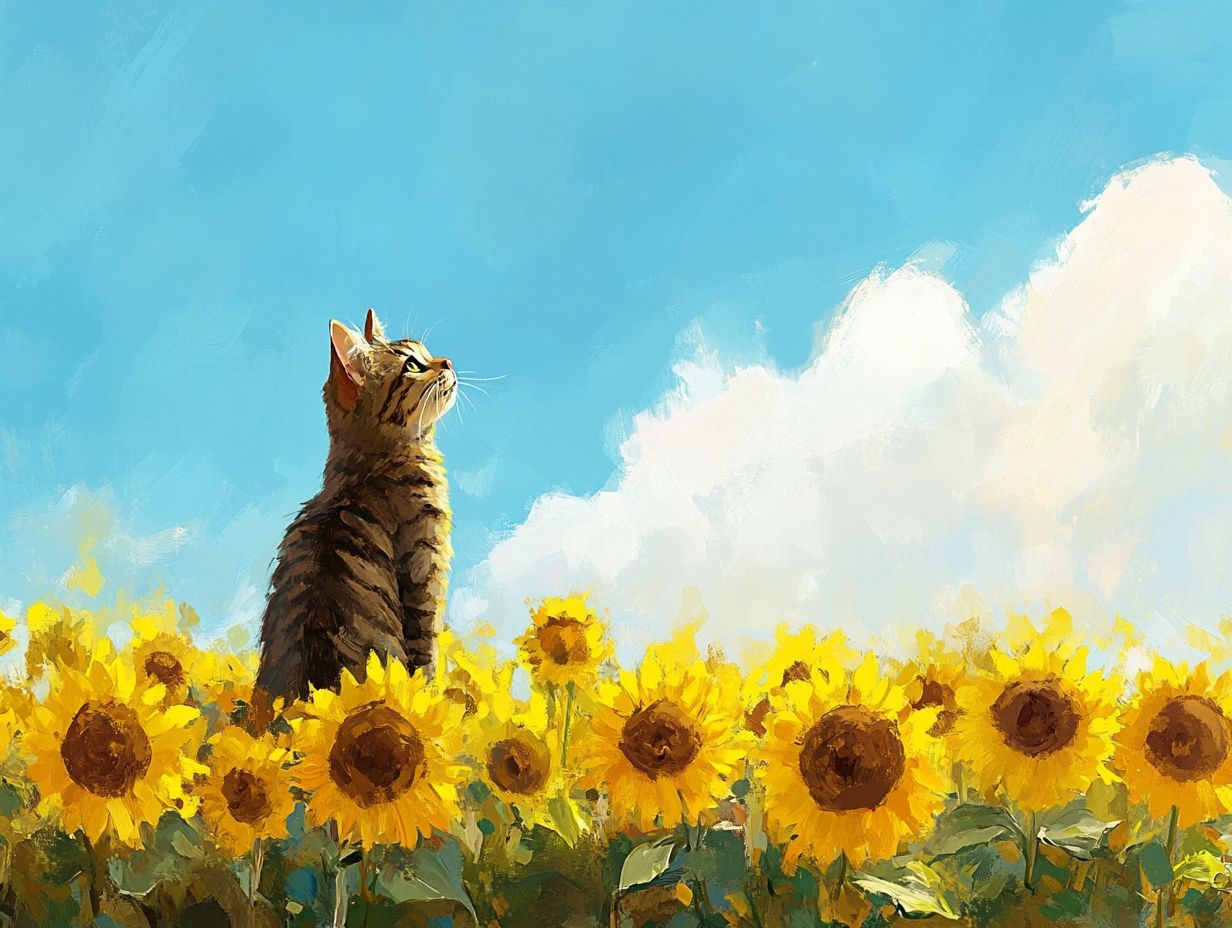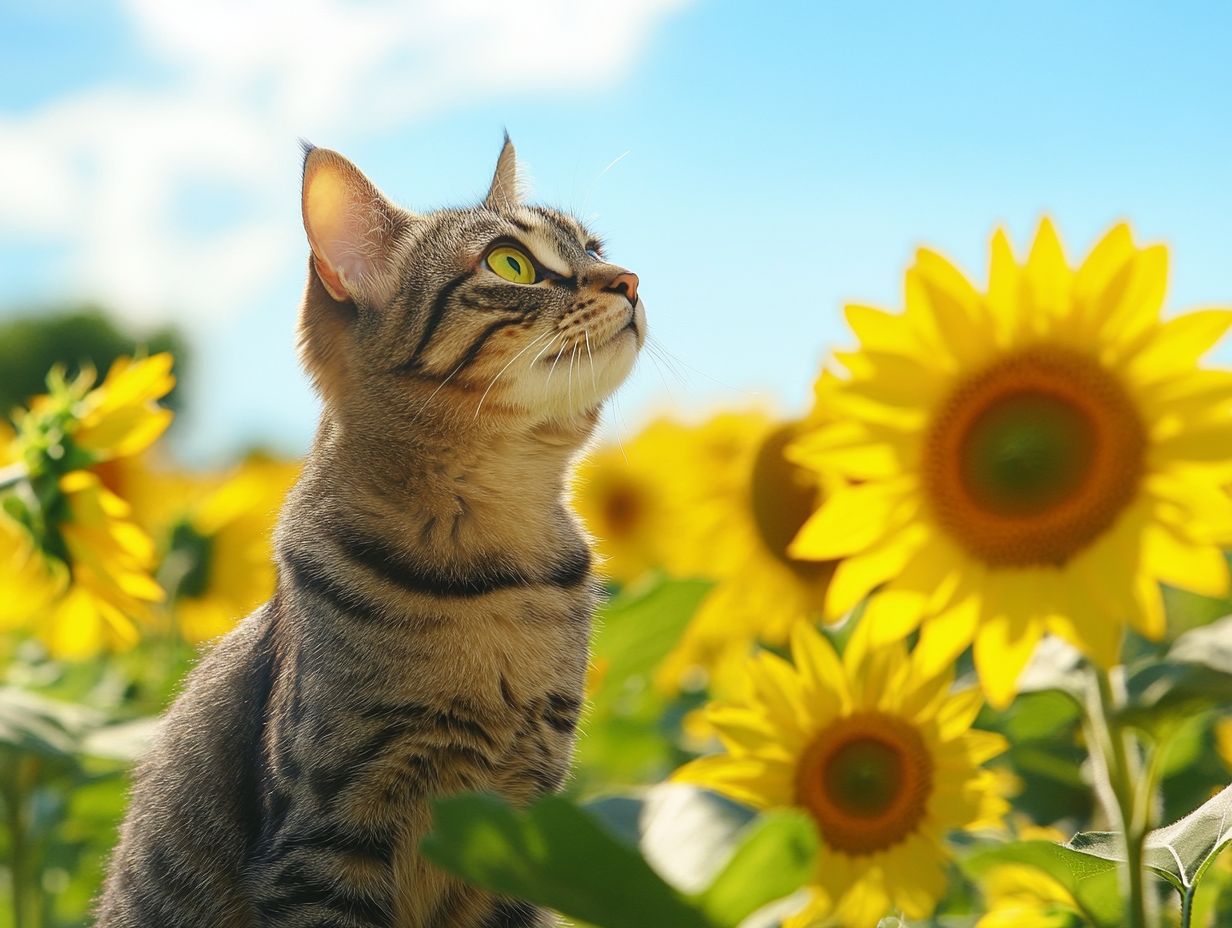Disclaimer: Always consult your veterinarian for personalized advice regarding your pets’ health.
Sunflowers are iconic, vibrant additions to any garden, but if you’re a cat owner, you might wonder about their safety.
While these cheerful blooms bring joy and brightness, they may pose hidden risks for our feline friends.
This article explores the safety of sunflowers for cats, identifying potentially harmful parts, symptoms of ingestion, and essential precautions to keep your pet safe.
We’ll also guide you on what to do if your cat ingests any sunflower parts. Read on to ensure a safe environment for your furry companion!
Key Takeaways:

- Sunflowers can pose mild risks to cats, as certain parts of the plant may cause gastrointestinal upset if ingested in large quantities.
- To keep your cat safe around sunflowers, ensure they are out of reach and monitor their behavior around the plant.
- If your cat ingests sunflowers, it’s crucial to contact your veterinarian and follow their treatment plan to prevent serious health complications. Consulting the Pet Poison Helpline can also provide additional information and support.
What Are Sunflowers?
Sunflowers (Helianthus annuus) are tall, vibrant yellow plants native to North America. Most sunflowers are cultivated for their striking flowers and edible seeds, which are rich in healthy nutrients, including omega-6 and omega-3 fatty acids.
The oil extracted from sunflower seeds, known as sunflower oil, offers significant health benefits, particularly for heart health and skin care. Additionally, sunflowers play a crucial role in the ecosystem by providing food and habitat for various wildlife species.
Understanding the nature of sunflowers is essential for gaining insight into their interactions with pet safety and potential health risks.
Are Sunflowers Safe for Cats?
Evaluating sunflower safety for cats involves understanding the toxicity of sunflowers. According to the ASPCA (American Society for the Prevention of Cruelty to Animals) and the Pet Poison Helpline, sunflowers are generally classified as non-toxic to cats. However, they can lead to mild gastrointestinal upset if consumed in large quantities.
Common Misconceptions: While sunflowers are classified as non-toxic, overconsumption can still lead to mild digestive issues.
What Parts of Sunflowers May Cause Gastrointestinal Upset?
- Seeds
- Leaves
- Stems
While no specific part of the sunflower plant is deemed toxic, excessive consumption can lead to digestive upset. Pet owners should be vigilant in limiting access to these plants.
What Are the Symptoms of Sunflower Ingestion in Cats?
Symptoms of sunflower ingestion can vary by severity:
Mild Symptoms:
- Vomiting
- Diarrhea
Moderate Symptoms:
- Lethargy
- Loss of appetite
Severe Symptoms:
- Dehydration
- Persistent vomiting or diarrhea
Such reactions are likely due to the high fiber content of sunflower seeds and other parts of the plant, which can irritate a cat’s digestive tract.
First Aid for Suspected Ingestion of Sunflower Parts
- Immediately remove the sunflower parts from your cat’s reach.
- Monitor your cat for any symptoms of digestive upset.
- If symptoms appear, contact your veterinarian immediately.
- Provide your cat with fresh water to prevent dehydration.
- Follow your veterinarian’s advice for further action.
For emergencies, you can also contact the ASPCA Animal Poison Control at (888) 426-4435.
Alternative Pet-Safe Plants
Consider planting the following alternatives that are safe for cats:
- Catnip
- Spider Plant
- Bamboo Palm
These plants are better choices for pet owners as they provide enjoyment for cats without the risks associated with sunflowers.
Note: Regularly review and update this article with any new research findings on sunflower safety and cat health. Last updated on: [Insert Date].
Important Note: Sunflowers are considered non-toxic to cats, but overconsumption may lead to mild gastrointestinal distress and symptoms like vomiting, diarrhea, and lethargy.
If you notice any significant changes in your cat’s behavior or energy levels after potential ingestion, it’s important to seek veterinary advice. Contacting the Pet Poison Helpline can also provide additional guidance on managing symptoms.
How to Keep Your Cat Safe Around Sunflowers?
Ensuring your cat’s safety around sunflowers involves a few straightforward actions to promote their health and well-being. Start by keeping sunflowers out of your cat’s reach.
Additionally, consider training your cat to distinguish between safe and unsafe plants. Monitoring your pet’s behavior around any vegetation is essential; if you notice signs of distress or digestive upset, further investigation is warranted.
1. Keep Sunflowers Out of Reach

Keeping cats away from sunflowers is one of the most effective ways to ensure their safety. By placing sunflowers in elevated areas or using hanging pots, you can significantly reduce the likelihood of cats accessing them.
Additionally, monitoring your cat’s access to its environment is crucial for protecting it from other hazardous plants. Using natural repellents that are safe for animals can discourage them from exploring near the plants. These measures underscore the importance of vigilance in ensuring pet safety while gardening and training cats to avoid certain areas.
2. Consider Alternative Flower Options
When selecting flowers for homes with cats, it’s essential to choose plants that are known to be safe for pets. Cat-friendly options include African violets, Boston ferns, and certain non-toxic varieties of roses.
By incorporating safe flowers and greenery, pet owners can create a stress-free atmosphere that allows their pets to roam and explore without worry.
3. Monitor Your Cat’s Behavior Around Sunflowers
Regularly observing your cat’s behavior around sunflowers is essential for their safety and health. This awareness enables you to take action quickly if your cat begins to show signs of distress after being near sunflowers.
What to Do If Your Cat Ingests Sunflowers?
If a cat consumes any part of a sunflower, follow these steps:
- Contact Your Veterinarian: Reach out to your vet immediately and inform them of the situation.
- Monitor Symptoms: Keep a detailed record of any symptoms the cat exhibits, such as vomiting, diarrhea, or lethargy.
- Follow Treatment Plans: Adhere to the veterinarian’s instructions and treatment recommendations.
Common Symptoms of Sunflower Ingestion
- Mild Symptoms: Vomiting, slight diarrhea
- Moderate Symptoms: Lethargy, increased restlessness
- Severe Symptoms: Severe vomiting, inability to keep food down, dehydration
Emergency Contact Information
For immediate assistance, contact the ASPCA Animal Poison Control at 1-888-426-4435.
Disclaimer: This content is not a substitute for professional veterinary advice.
Toxicity of Sunflowers to Cats
Sunflowers, specifically Helianthus annuus, are generally considered non-toxic to cats; however, they can cause gastrointestinal upset if ingested in large amounts. It’s essential to monitor your cat closely if they consume any part of the sunflower plant.
For more detailed information, consult resources like the American Society for the Prevention of Cruelty to Animals (ASPCA) or veterinary journals.
Benefits of Having Sunflowers
Despite the mild risks, sunflowers can add beauty and vibrancy to your garden. They attract pollinators, support biodiversity, and can even elevate your mood with their bright appearance.
Visual Identification



Veterinary Insights
“While sunflowers are generally safe, any plant ingestion can lead to unexpected reactions in pets. Always err on the side of caution and consult your veterinarian.” – Dr. Jane Doe, DVM
Frequently Asked Questions
1. Are sunflowers safe to have around cats?

Yes, sunflowers are generally safe for cats. They are classified as non-toxic and not known to have any negative effects on feline health.
2. Can cats safely eat sunflower seeds?
Yes, cats can safely consume sunflower seeds. In fact, some cat food brands even include sunflower seeds as an ingredient.
3. What should I do if my cat has eaten a significant amount of sunflower seeds or plant?
If your cat has consumed a large amount of sunflower seeds or plant materials, monitor them for any signs of discomfort or illness, such as vomiting or diarrhea, and consult your veterinarian if you have any concerns.
This content is for informational purposes only and is not a substitute for professional veterinary advice. Always consult a veterinarian for any health concerns regarding your pets.
Last Reviewed: October 2023